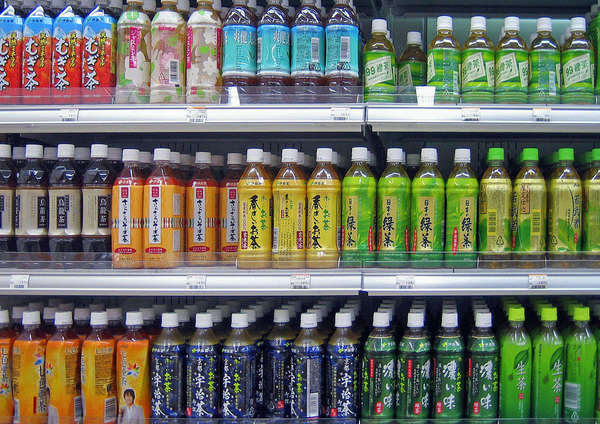Bottled Tea
Wikipedia: Canned_teaLast Updated: Sep. 25, 2017Bottled tea is iced tea that has been brewed and bottled before it is sold and consumed. Within the tea industry and food industry, these products are referred to as ready-to-drink (RTD) tea.
Sometimes such pre-brewed tea is also packaged in cans or other types of packaging, although we refer to all such tea as "bottled tea" for convenience. In the U.S., about 20% of tea purchased is pre-brewed and packaged in this manner, according to the Tea Association of the U.S.[1]
RateTea does not list bottled teas for rating and review. The main appeal of bottled tea is convenience and predictability. While the quality of bottled teas is widely variable and bottled teas are certainly worthy of rating and review, we believe that bottled tea is different enough from loose-leaf and bagged tea that it does not fit with the purpose of RateTea for several reasons:
- Bottled tea removes the element of experimentation in brewing tea, an experience crucial in helping people develop their taste for and appreciation of tea.
- Most bottled teas contain sugar or high fructose corn syrup, often in large quantities, and the sugar cannot be removed if one desires a less sweet tea. Some bottled teas have more sugar than coca-cola.[2] Although far from conclusive, several studies have suggested that bottled teas may lack some of the health benefits of brewed tea and may have additional health risks.[3] In particular, the antioxidants in tea degrade over time.[4] A bottled tea, SoBe green tea, made the list of the 20 Worst Drinks in America published by Men's Health magazine.
- Bottled tea is less sustainable than brewed iced tea. Even if bottles are recycled (and they often are not), the process of making new bottles, bottling the tea, transporting and distributing it, selling it, and recycling old bottles uses more energy and resources than brewing your own iced tea in reusable containers.
The Bottled tea industry
The bottled tea industry is rapidly growing in the U.S. The consumption of ready-to-drink teas has increased faster than soda in recent years.[5] The growth of this industry has mixed implications for health; some of these products can be equal to or worse than soda in their sugar content, but others are superior. Either way though, these products are less sustainable than people brewing their own tea.Bottled teas with less or no sugar
People seeking high-quality, organic bottled tea which is lower in sugar, from a company interested in sustainability, may want to look at Honest Tea. Steaz also sells unsweetened iced green tea in cans, and Matcha Love sells unsweetened matcha cans. Those seeking unsweetened or lightly sweetened Japanese bottled tea might check out Ito En Tea: their Teas' Tea brand offers unsweetened bottled tea. Gold Peak Tea also sells unsweetened bottled tea.For bottled rooibos, consider Rooibee Red sells an unsweetened herbal tea which is also organic certified.
A number of tea companies have experimented unsuccessfully with unsweetened bottled tea. Adagio teas had released a line of unsweetened bottled teas called Anteadote, but it was discontinued. Harney & Sons still sells bottled tea, but discontinued their only unsweetened offering.
Drinking fresh-brewed iced tea instead of bottled tea
At RateTea we encourage all people to move to brewing and drinking freshly brewed iced tea, ideally brewed from loose-leaf tea, rather than bottled tea. Freshly brewed tea from loose-leaf or tea bags is not only healthier, but both are more sustainable options, with loose-leaf tea being the best option. If you mainly drink bottled tea, we would encourage you to explore this site to learn more about all that loose-leaf tea has to offer. But even if you do not move to loose-leaf tea, brewing your own tea from tea bags can be significantly healthier and more sustainable than drinking pre-brewed bottled tea.If you want or need the convenience of a bottled tea, you can brew your own tea at home, and then chill the tea, fill your own bottle with the iced tea, and drink it at your convenience. This method has the advantages of avoiding artificial additives and ensuring that the tea you are drinking is freshly brewed.
References
1. P.S. Sundar, Tea in bottles, cans key to win over US markets, sify.com: Business Line, Jan. 27, 2008.
2. Kelly Burke, Iced not so nice: some bottled tea drinks found to be sweeter than Coke, Sydney Morning Herald, Oct. 31, 2006.
3. William I. Lengeman III, Iced Tea vs. Hot Tea, The English Tea Store: Tea Blog Oct. 14, 2009.
4. Meagen Voss, Bottled Tea Comes Up Short In Antioxidant Tests, NPR Health Blog, Aug. 23, 2010.
5. Elizabeth Dobos, RTD Tea Market is Growing Faster Than Soda, World Tea News, Mar. 27, 2017.


